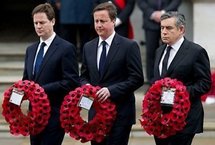British opposition leaders in talks to end deadlock
Robin Millard
LONDON, Robin Millard- Britain's opposition leaders Saturday held their first face-to-face talks on thrashing out a pact to enter government and end the political deadlock left by the general election.
Conservative leader David Cameron and Liberal Democrat chief Nick Clegg met alone for 70 minutes to discuss options for joining forces to oust Prime Minister Gordon Brown's Labour Party from office after 13 years.

Liberal Democrat chief Nick Clegg, Conservative leader David Cameron and Prime Minister Gordon Brown attend a VE Day memorial service at the Cenotaph in central London.
Brown later called Clegg for what was again described as an "amicable" conversation.
The three leaders stood side by side in silence Saturday at a service marking the 65th anniversary of Victory in Europe Day.
But despite the show of unity, Britain remained in political limbo with Cameron holding the most seats in parliament, Brown still in nominal power and Clegg the so-called kingmaker following Thursday's vote.
Clegg gained his party's endorsement Saturday to enter talks with Cameron, whose "big, open and comprehensive offer" to the Liberals had opened the door to talks.
At a London venue, three separate meetings of senior party figures, Lib Dem lawmakers and the party's federal executive each gave their "full and complete" backing to Clegg's approach.
But some 1,000 protesters gathered outside to urge Clegg not to compromise on the party's key commitment to replace Britain's first-past-the-post voting system with proportional representation, which would boost smaller parties like the Lib Dems, the perennial third-place finisher in British elections.
The Conservatives won the most seats in the Thursday's vote but ended up 20 short of an overall majority in the 650-seat House of Commons, leaving Britain with its first hung parliament for 36 years.
The Conservatives now have 306 lawmakers, compared to 258 for Labour. The Liberal Democrats dropped back to 57 seats. Northern Irish parties make up the bulk of the rest.
Cameron emailed supporters to say Britain expected the Conservatives and Liberals to "work out how we can deliver strong and stable government to tackle Britain's big and urgent problems."
Drawing red lines, he said: "I do not believe any future government should give more powers to Brussels, be weak on immigration or put the country's defences at risk. So we will stand firm on these issues."
But he also said there were areas where the Tories could "give ground... in the interests of forging an open and trusting partnership.
"Inevitably, these negotiations will involve compromise. But that's what working together in the national interest means.
"I hope we can sort things out as quickly as possible, for the good of the country. But we won't rush into any agreement."
Four-strong teams of Conservative and Lib Dem negotiators held a first meeting on Friday and are due to meet again Sunday morning.
Few expect them to finalise a power-sharing deal before the financial markets open on Monday.
The parties are not natural bedfellows, with the Lib Dems closer to Labour in many areas.
If a deal cannot be done, Cameron is prepared to try to rule as a minority Conservative government, relying on ad hoc support from smaller parties.
Clegg said the Lib Dems were negotiating in a "constructive spirit" and making the case for their four key priorities: tax reform, education, the economy and the existing political system.
Electoral reform is likely to be the biggest sticking point. The Conservatives are in no mood for changing the voting system.
Meanwhile Brown is still in the prime minister's 10 Downing Street residence, with his government still in place.
Queen Elizabeth II cannot appoint a new premier before Brown tells her he can no longer command the confidence of the House of Commons.
Brown is open to discussions with the Lib Dems if they and the Conservatives cannot strike a deal, and has dangled "immediate legislation" on electoral reform before them.
Brown telephoned Clegg for talks late Saturday, the Lib Dems revealed.
"At the request of the prime minister, Nick Clegg took a call from Gordon Brown this evening. The conversation was amicable," a party spokesman said.
"The Liberal Democrats will continue with the approach which Nick Clegg has set out and which was endorsed today by the parliamentary party and the party's federal executive."
The pound slumped to a 13-month low against the dollar on fears the deadlock would hamper Britain's ability to tackle its giant public debt.
-------------------------------------------------------------------------------